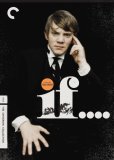| Reviews & Columns |
|
Reviews DVD TV on DVD Blu-ray 4K UHD International DVDs In Theaters Reviews by Studio Video Games Features Collector Series DVDs Easter Egg Database Interviews DVD Talk Radio Feature Articles Columns Anime Talk DVD Savant Horror DVDs The M.O.D. Squad Art House HD Talk Silent DVD
|
DVD Talk Forum |
|
|
| Resources |
|
DVD Price Search Customer Service #'s RCE Info Links |
|
Columns
|
|
|
If.... - Criterion Collection
THE MOVIE:
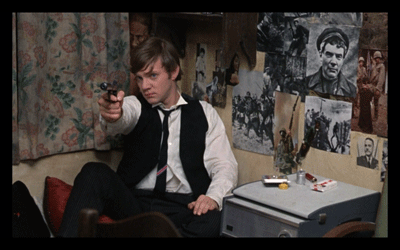
Boarding schools have provided many a filmmaker with a ripe setting to create commentaries on the pitfalls of society. Having never been to one myself, they seem like strange and foreign environments to me. Self-encapsulated, estranged from the rest of the world, they are civilization in miniature. Writers and directors of all stripes step back into the hallowed halls of private and public academia to exorcise the demons of their youth (such as Volker Schlöndorff's Young Törless) and to comment on a system that emphasizes conformity over individuality (Keith Gordon's Chocolate War).
As a top example of the genre, I am surprised that Lindsay Anderson's tale of brutality at a British boarding school, If...., isn't more notorious than it is. Sure, I've seen it mentioned in books on cinema, and it's been one of those films that has been on quite a few lists over the years of movies that needed to be released on DVD, but it still seems to have mainly sailed under the radar since its Cannes-winning release (I mean, why didn't I hear about this flick back in high school?). Made in 1969, If.... is an acidic assault on the imbalance of power, one that likely felt potent at the end of the 1960s, as student revolt and protest started to drift from hopeful action to aimless flailing. It certainly strikes a powerful chord today, when its message and the methods by which its antiheroes get their vengeance seem eerily prophetic.
If.... was a young Malcolm McDowell's first movie. He plays Mick Travis, the head of a trio of boys that one headmaster dubs the "Hair Rebels." A title card in the film (the narrative is broken into distinct chapters) refers to them as "Crusaders." They certainly represent the downtrodden in this mini community. The boys at this school are endlessly splintered into groups. By house, by class, by room, they are forever compartmentalized. Four sadistic boys known as the Whips rule over College House, and they can easily bully the younger students into doing what they want, but Mick and his gang cause a bit more trouble. They're the boys with the bad attitudes who see through the façade of power and privilege.
The school in If.... is governed by a mysterious, archaic set of rules. Hair must be a certain length, freshman boys must know the names of everyone in the senior class, and specific materials are required in specific drawers in each student's desk. The Whips order the other kids around, making some boys act as their servants, meting out punishment for infractions real and imagined. These penalties can range from cold showers to humiliating whacks with sticks. In the recent documentary The Ghosts of Abu Ghraib, the filmmakers use footage from a famous academic study where it was shown that regular people would inflict cruelty on their fellow man if they believed a voice of authority was ordering them to; likewise in If...., the boys submit to their punishment with a quiet resignation. This is the way it is done, allegedly it's how it's always been done, just accept it.
Isolated as they are, the kids at this school are drawn toward every fruit the rules forbid. In their study room, Mick and the others tack up pictures of fighting men in threatening poses while hiding their skin mags out of sight. They drink and they smoke, and occasionally they sneak off the grounds to take their rebellion a little further. Of course, they aren't the only ones who partake. The ruling element does, as well, even going so far as to try to tempt Bobby (Rupert Webster), a boy who serves as their butler, into performing other services for them. How fitting that he would eventually gravitate to Mick's mate, Wallace (Richard Warwick), providing the film with both one of the few moments of tenderness (a brief scene of them asleep together) and one of the only acts of heroism (Wallace lets Bobby bolt while he alone takes the blame for being in a restricted area). The rest of If.... is devoid of any real human warmth. Mick accuses the head of the Whips, the smug Rowntree (Robert Swann), of being frigid, and it inspires Rowntree's most sadistic act of wrath--most likely because he's irked by the truth.
As these things go, there is only so much abuse the Crusaders are going to take before they've had enough. Ditching a rugby match (organized sports=institutionalized brutality) and taking a joyride on a stolen motorcycle, Mick and Johnny (David Wood) taste a freedom the school denies them. The scene leading up to the theft gives us the symbolism that will define their ultimate action in the movie. First they run through the streets handcuffed together, and then in a play of mock hostility, Mick knocks Johnny to the ground, securing their separation. Only violence will break them out.
Riding down a country highway, the boys stop at a roadside café, where they meet "The Girl" (Christine Noonan). When Mick tries to kiss her, acting with the same prim entitlement as the dark lords of his alma mater, Christine lashes out at him. She not only shows him he can stand up, but she also unleashes a more primal force within him, turning the tables by declaring she is a tiger and moving on him as such. He fights back in the same way, and it's almost as if from there he has reverted to his natural state, accepting that it's not man's place to take orders.
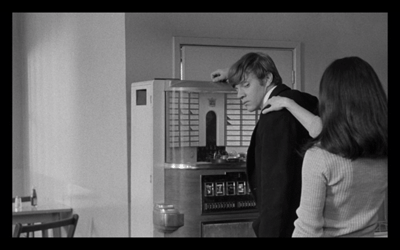
It's fitting that this is one of the many scenes in If.... that Lindsay Anderson decided to shoot in black-and-white. Though there are many non-artistic explanations for why some scenes aren't in color, what ends up on the screen transcends budgetary concerns and is artistic regardless of the viability of said concerns. Whenever the image shifts to black-and-white, the whole mood shifts with it. It's not that these sequences are that different from the rest of the film's action, but the absence of color lends them a surreal gravitas. They automatically come off as more serene than the anger-fueled color scenes. The black-and-white sequences also have a narrative importance. The switch signals that something crucial is going to happen--Bobby and Wallace notice each other, Mick meets the Girl, the boys find the tools for their vengeance.
The final chapter of If.... plays out on the day of one of the school's most pompous, self-aggrandizing ceremonies. Parents have gathered in the chapel with the teachers and students to hear the praises of the institution sung by an aging general who refuses to loosen his grip on tradition. Around him, the priests wear their most ostentatious costumes, and another member of the staff dresses in a full suit of armor. It's a ludicrous display, revealing these methods as outmoded even as their champions pat themselves on their backs for not giving in to progress. Blind to the dissent fomenting all around them, they run straight into an ambush.
The scenes of violence that follow aren't particularly gory or shocking, but they do serve to release the pressure that has been building throughout the movie. As viewers, we realize we've been holding our breath, automatically siding with the rebels (and thus, ironically, conforming to what the narrative demands) and finally exhaling when they return all the punishments on their tormentors. Rather than slide out with a tidy resolution, Lindsay Anderson stops the climax in mid-action, cutting to a black screen and the title printed in blood red letters. If.... The ellipsis is for the viewer to fill in. If what? If we don't check this kind of regimented oppression, an uprising is surely to happen? If a man is pushed often enough, he'll push back? Or is it to signal that this is just fantasy, merely allegory, and not to be taken as realism?
Either way, while the first three periods of the ellipsis indicate a trailing off, an omission that needs to be reinstated, the fourth period indicates finality. Though the thought trails off, it does end somewhere.
And where it ends will make all the difference.
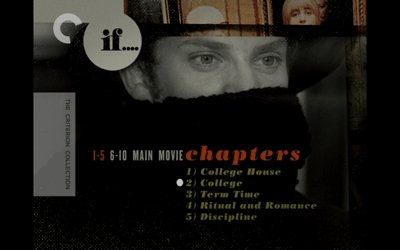
THE DVD
Video:
The new transfer for If.... - Criterion Collection was restored under the supervision of director of photography Miroslav Ondricek and assistant editor Ian Rakoff. The movie was shot at a 1.66:1 aspect ratio, and this DVD preserves that. Both the color and the black-and-white sequences have been given a thorough cleaning, removing all dirt and scratches. The color values are strong, maintaining the intended vibrancy, and I saw no artifacting or digital enhancement. Once or twice there was a hazy flicker in the background, but it was very minor, and at least once it was in a dark scene where it appeared a flaw in the shooting maybe couldn't be rectified. Either way, If.... has an amazing looking picture.
NOTE: My screengrabs look picture boxed, but it's a fault of my monitor; I watched this DVD on a 16X9 TV and the image filled the screen as it was supposed to.
Sound:
For all of our fancy audio equipment and the possible multi-channel mixes, there is something to be said for the sound design of a straightforward mono soundtrack. Criterion sticks to the original sound, as the film was made and was intended, and it rings through the speakers clear as a bell. No need to spruce it up further, it's all there.
Extras:
The If.... - Criterion Collection DVD is a two-disc set. The first disc houses the film, as well as a full-length audio commentary by film critic David Robinson (recorded specifically for this disc) and the movie's star, Malcolm McDowell (audio taken from a 2002 interview). The set-up would make you think that McDowell would only have a spotty presence on the track, but his excerpts are actually long and involved, and it's clear that Robinson chose those pieces because he comments on them sometimes. The set-up works fabulously. McDowell is conversational, nostalgic, and full of great anecdotes. Robinson is super informative, giving lots of background on the film and on Lindsay Anderson, and he even has some on-set info, having visited the shoot.
DVD 2 is devoted entirely to supplements, of which there are three.
The first: an If....-centric installment of Cast and Crew from 2002. The Scottish TV show brings together McDowell, Ondricek, Rakoff, director's assistant Stephen Frears, producer Michael Medwin, and screenwriter David Sherwin to look back at the movie. It forty-two minutes of refreshingly uninterrupted group conversation. They don't even cut it up with clips. Only McDowell is pretaped, but the host works the conversation in such a way that his comments fit in the flow of conversation, and then the rest of the panel comments on it. An excellent retrospective.
The second: a new interview with Graham Crowden (14 minutes, 40 seconds), who played the history teacher in the movie. He was also friends with Lindsay Anderson, and they worked together both on film and on the stage. He has a sharply self-deprecating sense of humor that is charming.
The third: a 1954 documentary called Thursday's Children, directed by Lindsay Anderson and Guy Brenton, narrated by Richard Burton. This 22-minute film won the Academy Award for Best Short Documentary, and its portrait of a school for deaf children presents a much more idyllic picture of education than If.....
If.... comes in a clear, regular-sized plastic case with a double tray for the two discs on the inside. Since the plastic is clear, images are printed on both sides of the cover. A 28-page illustrated book contains a new critical essay, an article by David Sherwin, and excerpts from interviews with Lindsay Anderson.
FINAL THOUGHTS:
A cult classic of anarchic subversion, Lindsay Anderson's allegory of societal oppression and the revolt against conformity has long been absent from the DVD shelves. The If.... - Criterion Collection rectifies that, firing on all cylinders, giving us an excellent video package complete with groovy extras. This boarding school drama is surreal, incisive, and at times both funny and chilling. Malcolm McDowell is a natural, and the message of the picture is as relevant in 2007 as it was in 1969. Highly Recommended.
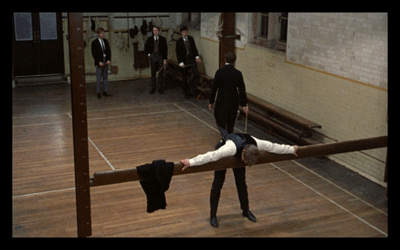
Jamie S. Rich is a novelist and comic book writer. He is best known for his collaborations with Joelle Jones, including the hardboiled crime comic book You Have Killed Me, the challenging romance 12 Reasons Why I Love Her, and the 2007 prose novel Have You Seen the Horizon Lately?, for which Jones did the cover. All three were published by Oni Press. His most recent projects include the futuristic romance A Boy and a Girl with Natalie Nourigat; Archer Coe and the Thousand Natural Shocks, a loopy crime tale drawn by Dan Christensen; and the horror miniseries Madame Frankenstein, a collaboration with Megan Levens. Follow Rich's blog at Confessions123.com.
|
| Popular Reviews |
| Sponsored Links |
|
|
| Sponsored Links |
|
|
| Release List | Reviews | Shop | Newsletter | Forum | DVD Giveaways | Blu-Ray | Advertise |
|
Copyright 2024 DVDTalk.com All Rights Reserved. Legal Info, Privacy Policy, Terms of Use,
Manage Preferences,
Your Privacy Choices | |||||||









